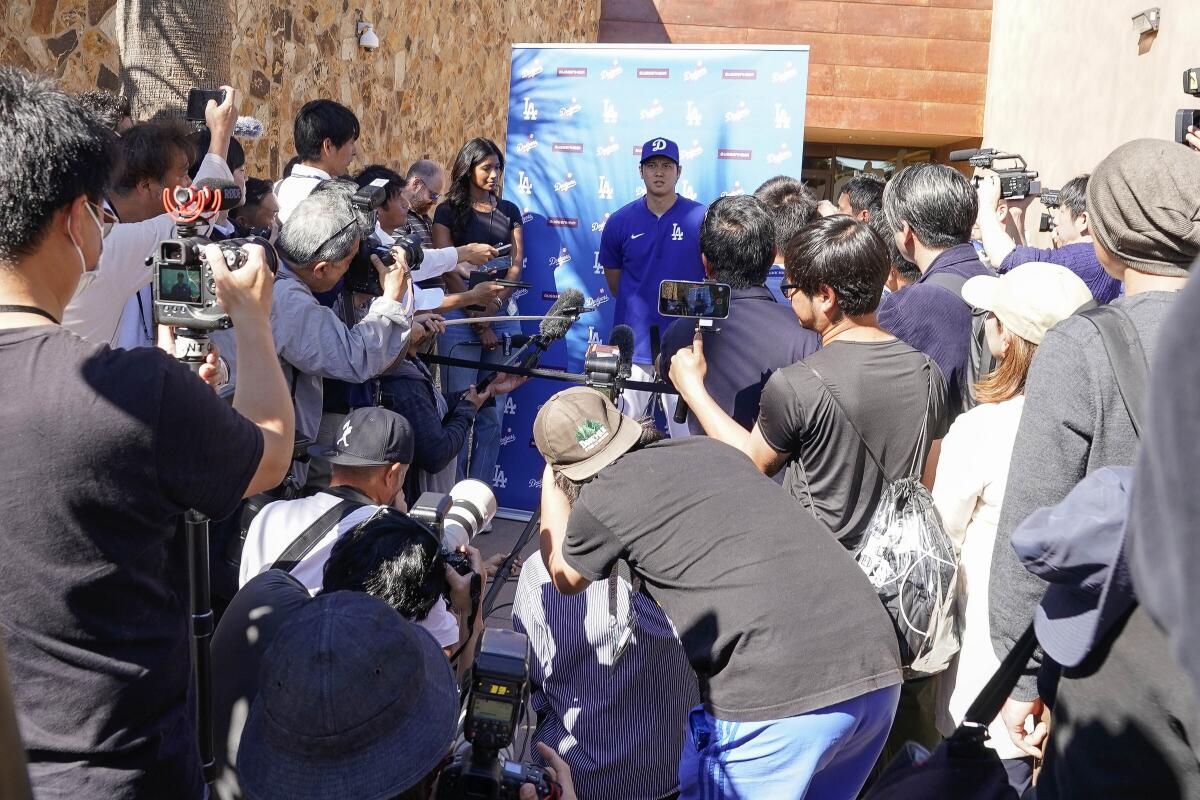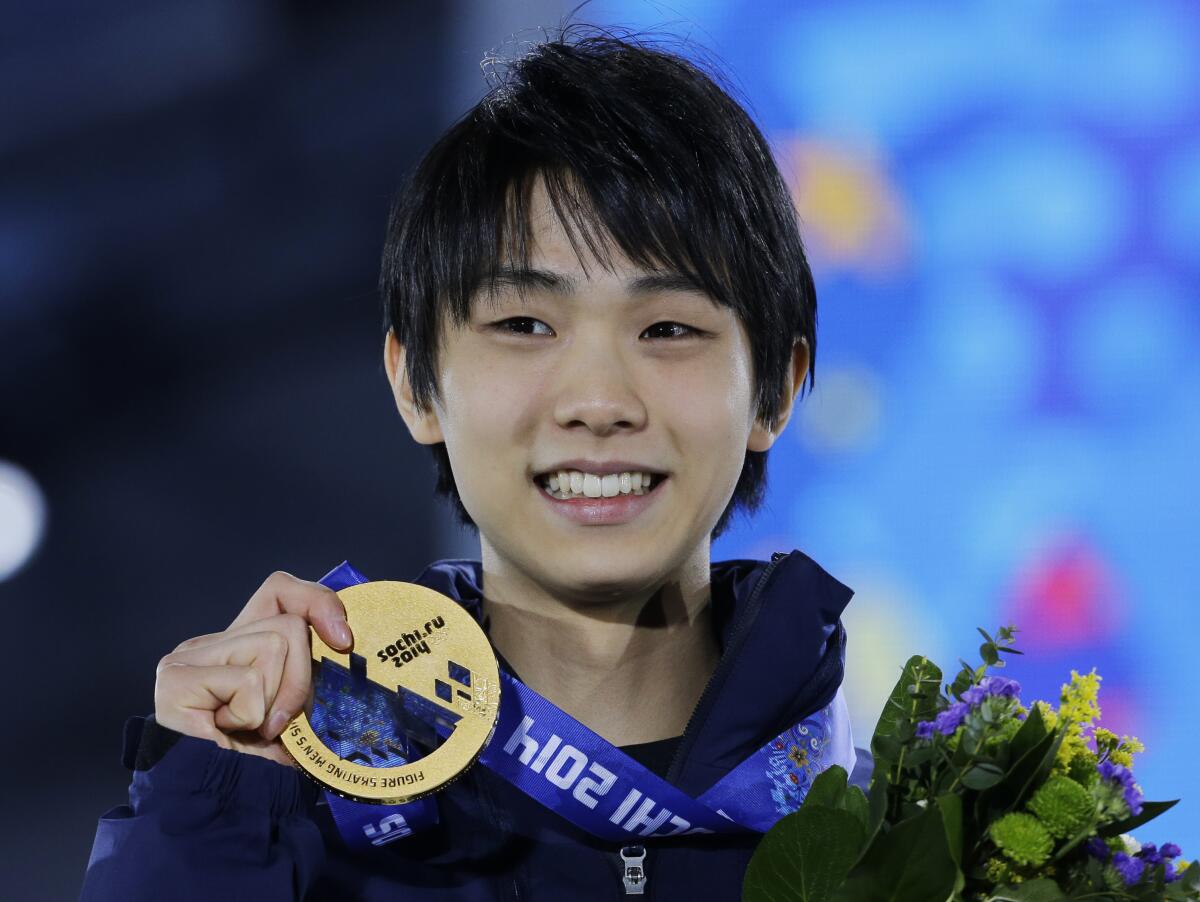Column: Shohei Ohtaniâs marriage announcement felt strange, but not if you know Japanese culture

Before Shohei Ohtani became Japanâs most popular athlete, that designation belonged to figure skater Yuzuru Hanyu.
Like Ohtani, Hanyu is 29.
Like Ohtani, Hanyu was born and raised in the Tohoku region, the northern part of Japanâs main island.
Last year, the retired Hanyu announced on social media that he was married. Three months later, he returned to the same platform with another announcement.
He was divorced.
A day after making a surprise announcement on social media that heâs married to a Japanese woman, Dodgers star Shohei Ohtani provides some details.
The two-time Olympic gold medalist said his family was harassed and became the unwanted subjects of media inquiries and reports. The identity of his wife, which Hanyu had kept secret, was divulged by a weekly tabloid magazine.
âWhen I thought about my future,â Hanyu wrote in Japanese, âI wanted my spouse to be happy, to have limitless happiness, so I made the decision to divorce.â
Hanyuâs story helps make sense of the bizarre manner in which Ohtani revealed his own nuptials this week.
Announcing a marriage on Instagram and holding a news conference on the subject but refusing to share the spouseâs name might strike Americans as peculiar. However, by the standards of Japanese culture â especially Japanese celebrity culture â nothing about this was abnormal.
To begin with, a personâs work and personal lives are more clearly delineated in Japan than in the United States. Romantic partners are rarely invited to work-related social functions, for example. Plus-ones arenât a standard feature of wedding invitations.
Athletes typically keep their relationships private until they are married, which is why news of their unions often feel as if they come out of nowhere. Ohtaniâs marriage was described by the Japanese media as a âshock wedding,â even though Ohtani said he got engaged last year.
Some Japanese baseball players married well-known sportscasters, including Ichiro Suzuki, Yusei Kikuchi and Kenta Maeda. Yu Darvish married a world champion Greco-Roman wrestler. Their wives already had public profiles before they were married and continued to maintain them. But in cases in which a player married an ippanjin â or civilian â the spouses remained anonymous. Hideki Matsui was one of the most popular Japanese players of all time, and not much is known about his ippanjin wife to this day.

Ohtani said he wed a ânormalâ Japanese woman, so the expectation is that she will attempt to stay in the shadows.
The marriage was announced in a message Ohtani posted in Japanese on his Instagram account. In the postâs comments section, another message was posted, this one in English. The contents of the two messages were similar but not the same.
In the Japanese version, Ohtani said he would speak to reporters the next day and asked journalists to refrain from contacting his or his wifeâs families. Ultimately, this was what Ohtani wanted to communicate. In exchange for sharing some details about his relationship, he was asking for privacy.
Ohtani indirectly repeated his request when he addressed reporters at the Dodgersâ spring training complex. Asked why he made the announcement, he said jokingly in Japanese, âIf I didnât [and you found out], youâd make a fuss.â The implication was that because he was addressing the situation, Japanese reporters shouldnât make a fuss.
If Ohtani were any other player, reporters probably would oblige him. But Ohtani isnât any other player. There is no American equivalent to him. He has become to Japan what Diego Maradona was to Argentina or what Julio CĂŠsar ChĂĄvez was to Mexico, an athlete who projects the virtues of his culture to the world. Japanese parents want their boys to grow up to be like him. Women dreamed of marrying him. (There were reports of women skipping work because they were devastated to learn he was taken.)
Ohtani isnât just famous. Heâs famous in a country in which the spotlight on celebrities is particularly intense. Japan has fewer television stations and fewer entertainment options than the United States. When an athlete or entertainer becomes well known, they become ubiquitous. Virtually everyone knows who they are.
The dynamic has resulted in Ohtaniâs marriage being treated as if it were a royal wedding, with Japanese television stations interrupting on-air programs to relay the news. There will be an appetite for information about Ohtaniâs relationship, particularly about the identity of his wife, and the countryâs notoriously aggressive tabloid magazines are certain to do everything in their power to satisfy that hunger.
KikĂŠ HernĂĄndez says being back with the Dodgers âfeels like home,â but he didnât enjoy the free agency process during an offseason he describes as âweird.â
Last year, Ohtani conducted an interview as part of an advertising campaign in which he described his vision for his home life.
âIncluding marriage and children â how do I say this? â Iâd like to live in peace,â Ohtani said. âI think having a peaceful soul is better than anything. Iâd like my private life to be like that.â
Hanyu was deprived of such an experience.
Hanyuâs cautionary tale should make the Japanese public sympathetic to Ohtaniâs request for privacy, but that alone wonât ensure it. Ohtani had to know this, which is why additional measures were taken. The way he announced his marriage might not have made sense to American audiences, but they did to anyone familiar with his culture.
More to Read
Are you a true-blue fan?
Get our Dodgers Dugout newsletter for insights, news and much more.
You may occasionally receive promotional content from the Los Angeles Times.










